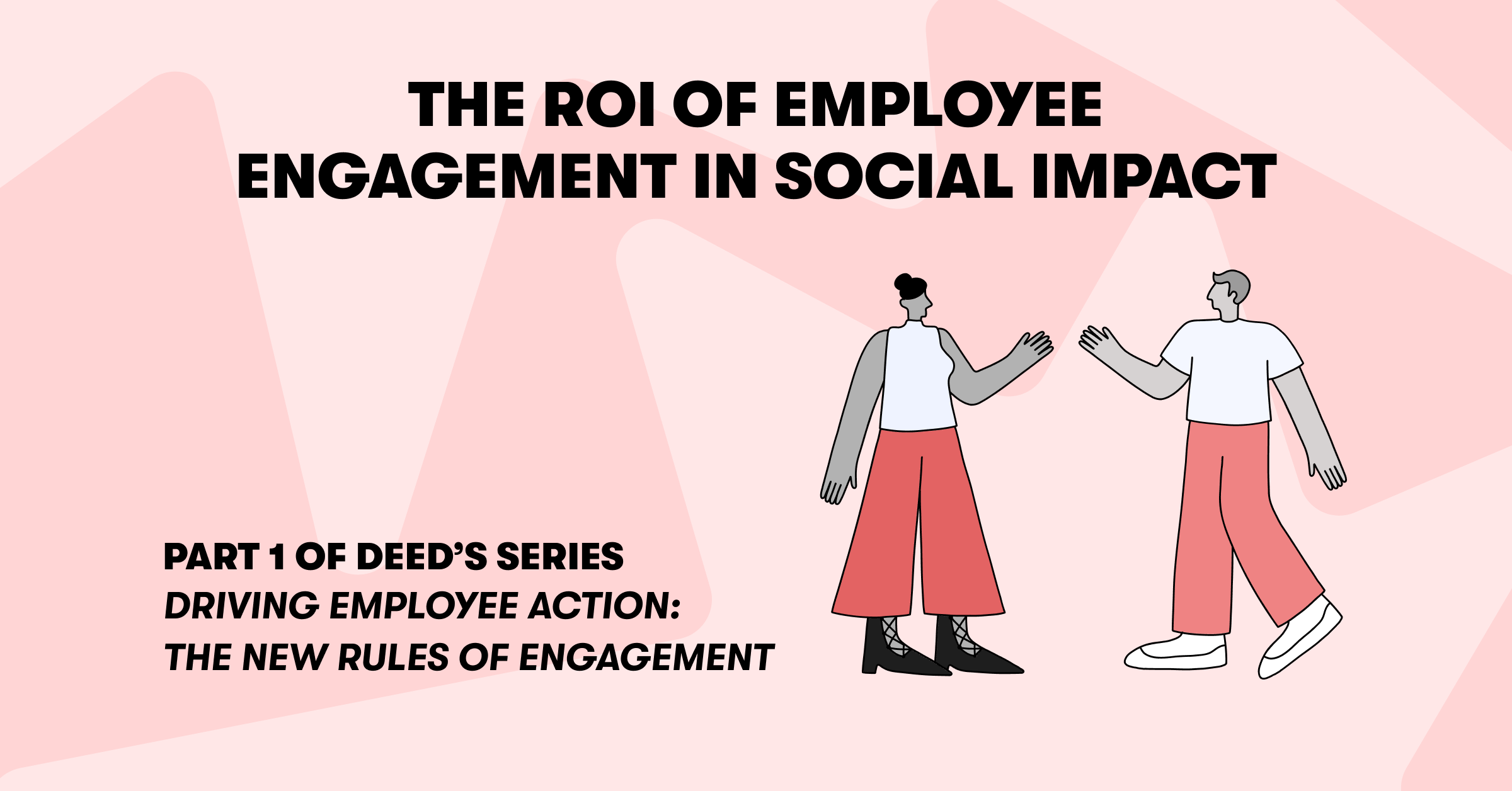The ROI of Employee Engagement in Social Impact
Part 1 of Deed’s Driving Employee Action: The New Rules of Engagement Series
Employee engagement is changing—and so are employee expectations. Today’s workforce wants more than participation—they want purpose, agency, and the ability to drive change.
At Deed, we believe that empowering employees through social impact isn’t just good for morale—it’s a business strategy. The most forward-thinking companies are reimagining volunteering, unlocking new forms of giving, and scaling purpose across regions and generations.
In Deed’s latest series - Driving Employee Action: The New Rules of Engagement - we explore the new rules of engagement: how to activate employees as changemakers, design modern programs that reflect how people want to give back, and turn social impact into a driver of loyalty, culture, and long-term ROI.
Why Employee Engagement Isn’t Just a Perk
The term "employee engagement" is often associated with internal newsletters, holiday parties, and ping-pong tables. But true engagement—especially in the context of social impact—is a strategic driver of business performance. When employees feel their work has meaning and contributes to the greater good, companies see measurable improvements in retention, productivity, and even revenue.
Gallup found that highly engaged teams show 21% greater profitability and 59% less turnover. Now layer in social impact: according to Project ROI, a well-designed corporate responsibility program can increase employee engagement by up to 7.5% and reduce turnover by up to 50%.
Let’s explore how connecting social impact with employee engagement generates measurable ROI—and how companies can make it happen.
The Business Case for Social Impact-Driven Engagement
Engaged employees aren’t just happier—they’re more loyal, productive, and innovative. And when those employees are given opportunities to contribute to meaningful causes, that engagement deepens further.
Key ROI Metrics:
- Retention: Turnover costs businesses between 50%–200% of an employee’s annual salary (Gallup). Companies with strong purpose-driven cultures see 40% lower turnover.
- Productivity: Engaged employees are 17% more productive and generate 21% higher profitability (Gallup).
- Attraction: 64% of millennials won’t take a job if the employer doesn’t have a strong Corporate Social Responsibility (CSR) policy (Cone Communications).
- Brand Advocacy: Employees who feel connected to their company’s social impact initiatives are significantly more likely to advocate for the brand—especially on social media, where employee-shared content generates up to 8× more engagement than posts from corporate accounts. (Sociabble)
What Modern Employees Want
Today’s workforce—especially millennials and Gen Z—is purpose-driven. According to Deloitte’s 2023-24 Gen Z and Millennial Surveys:
- 86% of Gen Zs and 89% of millennials say having a sense of purpose in their work is very or somewhat important to their overall job satisfaction
- 75% say an organization’s societal impact is important when considering an employer.
Employees want:
- Authenticity: Programs that reflect the company’s values and impact real change.
- Choice: Flexibility to support causes they care about.
- Inclusion: Opportunities that are accessible regardless of location, ability, or background.
Case Study: Ripple’s ROI in Purpose-Driven Engagement
Ripple’s approach to employee engagement is proof that purpose pays off. In 2024, 80% of Ripple employees actively participated in giving and volunteering programs—powered by Deed. That level of engagement isn’t just impressive—it’s a signal of deep employee commitment, a leading indicator of retention, productivity, and cultural strength.
Since 2018, Ripple has contributed more than $200 million through grants and matching programs, including $21 million in 2024 alone. When employees are given meaningful ways to give back—and the tools to do so easily—participation scales, impact grows, and ROI becomes clear.
Read more in Deed’s Ripple Partner Spotlight and explore the full 2024 Ripple Impact Report.
Designing an Effective Social Impact Engagement Strategy
- Start with Listening: Survey employees to learn what causes matter most to them. Use feedback to guide your program design.
- Offer Choice and Flexibility: One-size-fits-all doesn’t work. Allow employees to volunteer their time, donate money, or attend educational events on issues they care about.
- Make It Easy to Participate: Use technology like Deed to streamline access to opportunities, track hours, and enable mobile or remote participation.
- Connect Impact to Belonging and Culture: Invite ERGs to co-lead initiatives, host panels or give-back days that highlight underrepresented communities, and spotlight employees making a difference.
- Measure and Share Outcomes: Track engagement rates, hours volunteered, funds donated, and personal impact stories. Reporting back to employees helps reinforce the value of their contributions.
How Deed Helps You Engage Employees in Impact
Deed is more than a CSR platform—it’s a culture-building tool that drives engagement by making social impact personal, accessible, and measurable. We help:
- Connect employees to causes they care about
- Enable volunteering and giving from anywhere
- Integrate with HR systems for seamless data reporting
- Support employee engagement and belonging goals across departments
Conclusion: Impact Is a Culture Multiplier
Employee engagement isn’t a soft metric—it’s a leading indicator of your company’s resilience, productivity, and ability to innovate. When you integrate social impact into the employee experience, you multiply that engagement.
At Deed, we believe purpose is a shared experience. And we’re here to help you make it real, measurable, and meaningful.
Want to learn more about how Deed can help your company engage employees and amplify impact? Let’s talk!
![]()


